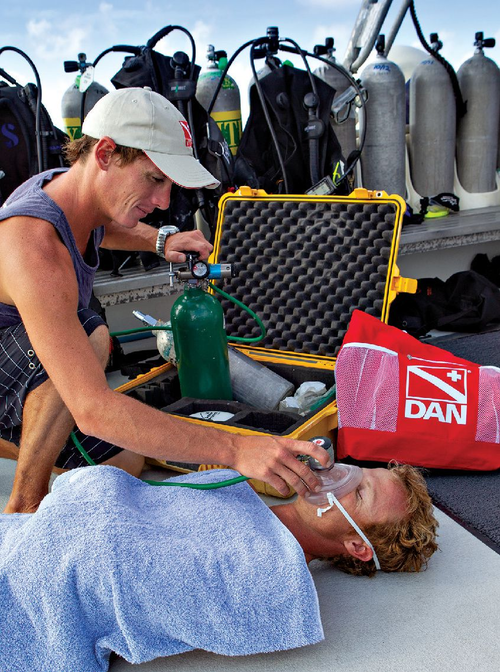PFO CONCERNS IN DIVE INJURY TREATMENT

Question: I recently took DAN’s online Basic Life Support: CPR and First Aid and emergency Oxygen for Scuba Diving Injuries courses. I’ve heard it is best to put an injured diver in the recovery position on their left side because of the possibility of a patent foramen ovale (PFO). Is this true, and what would be the benefit?
Answer: A PFO is undoubtedly a concern with diving because about 25 percent of the population has one. The recovery position supports and maintains an open airway in an
unconscious person or injured diver. The left-side preference was based on anatomy, not PFO concern. Blood from the venous system returns to the right atrium via the superior and
inferior vena cava, so the idea of putting a diver on the left side was to alleviate unnecessary weight that might compress these large vessels and impede circulation.
Recent studies and recommendations from the International Liaison Committee on Resuscitation (ILCOR), however, suggest there is no benefit to placing someone on their left side
instead of their right side when using the recovery position. In the case of suspected decompression sickness (DCS), place the injured diver in a position of comfort, or if they are
unconscious, one that allows you to monitor them as necessary. PFO concern is not a factor
in this case. If the diver is symptomatic and you are rendering care, then you need to treat the
symptoms. Give them the highest concentration of oxygen available, and get them to definitive health care and treatment. Remember that many conditions show symptoms that may mimic DCS. Just because someone was diving does not mean they have a dive-related illness.
When creating your emergency action plan, note the location of the nearest emergency room or where and how to access local emergency services.
— Robert Soncini, NR-P, DMT
Answer: A PFO is undoubtedly a concern with diving because about 25 percent of the population has one. The recovery position supports and maintains an open airway in an
unconscious person or injured diver. The left-side preference was based on anatomy, not PFO concern. Blood from the venous system returns to the right atrium via the superior and
inferior vena cava, so the idea of putting a diver on the left side was to alleviate unnecessary weight that might compress these large vessels and impede circulation.
Recent studies and recommendations from the International Liaison Committee on Resuscitation (ILCOR), however, suggest there is no benefit to placing someone on their left side
instead of their right side when using the recovery position. In the case of suspected decompression sickness (DCS), place the injured diver in a position of comfort, or if they are
unconscious, one that allows you to monitor them as necessary. PFO concern is not a factor
in this case. If the diver is symptomatic and you are rendering care, then you need to treat the
symptoms. Give them the highest concentration of oxygen available, and get them to definitive health care and treatment. Remember that many conditions show symptoms that may mimic DCS. Just because someone was diving does not mean they have a dive-related illness.
When creating your emergency action plan, note the location of the nearest emergency room or where and how to access local emergency services.
— Robert Soncini, NR-P, DMT
Categories
2025
2024
February
March
April
May
October
My name is Rosanne… DAN was there for me?My name is Pam… DAN was there for me?My name is Nadia… DAN was there for me?My name is Morgan… DAN was there for me?My name is Mark… DAN was there for me?My name is Julika… DAN was there for me?My name is James Lewis… DAN was there for me?My name is Jack… DAN was there for me?My name is Mrs. Du Toit… DAN was there for me?My name is Sean… DAN was there for me?My name is Clayton… DAN was there for me?My name is Claire… DAN was there for me?My name is Lauren… DAN was there for me?My name is Amos… DAN was there for me?My name is Kelly… DAN was there for me?Get to Know DAN Instructor: Mauro JijeGet to know DAN Instructor: Sinda da GraçaGet to know DAN Instructor: JP BarnardGet to know DAN instructor: Gregory DriesselGet to know DAN instructor Trainer: Christo van JaarsveldGet to Know DAN Instructor: Beto Vambiane
November
Get to know DAN Instructor: Dylan BowlesGet to know DAN instructor: Ryan CapazorioGet to know DAN Instructor: Tyrone LubbeGet to know DAN Instructor: Caitlyn MonahanScience Saves SharksSafety AngelsDiving Anilao with Adam SokolskiUnderstanding Dive Equipment RegulationsDiving With A PFOUnderwater NavigationFinding My PassionDiving Deep with DSLRDebunking Freediving MythsImmersion Pulmonary OedemaSwimmer's EarMEMBER PROFILE: RAY DALIOAdventure Auntie: Yvette OosthuizenClean Our OceansWhat to Look for in a Dive Boat
2023
January
March
Terrific Freedive ModeKaboom!....The Big Oxygen Safety IssueScuba Nudi ClothingThe Benefits of Being BaldDive into Freedive InstructionCape Marine Research and Diver DevelopmentThe Inhaca Ocean Alliance.“LIGHTS, Film, Action!”Demo DiversSpecial Forces DiverWhat Dive Computers Don\'t Know | PART 2Toughing It Out Is Dangerous
April
